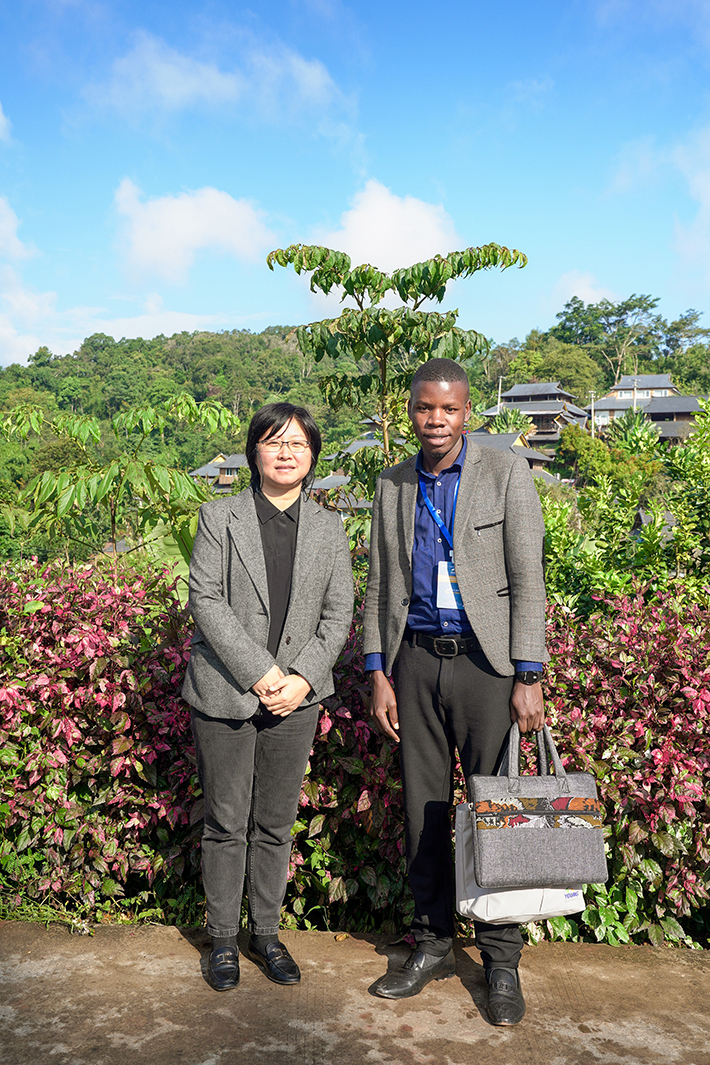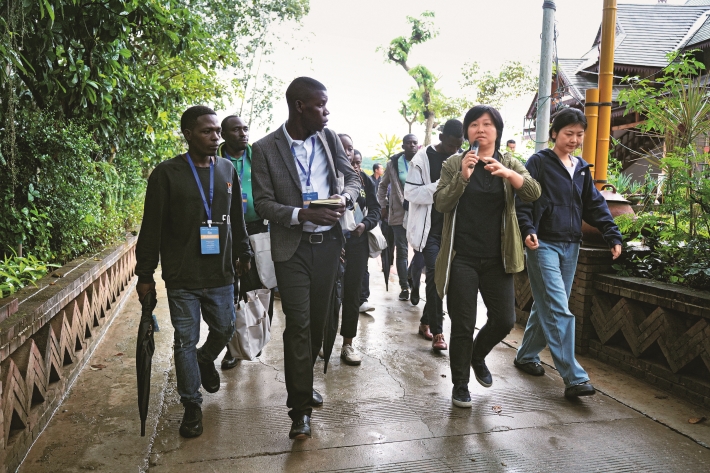|
||||||||||
| Home Top News Economy/Tech Culture/Sports China in Foreign Eyes Green Development Videos Intangible Cultural Heritages |
|
||||||||||
| Home Top News Economy/Tech Culture/Sports China in Foreign Eyes Green Development Videos Intangible Cultural Heritages |
| ChinAfrica |
| Cultivating Change |
| A young Ugandan harnesses digital media to drive agricultural transformation |
| By Li Xiaoyu | VOL. 17 November 2025 ·2025-11-04 |

Professor Xu Jin and Mwesigwa Samuel during a field study in Yunnan Province in November 2024 (COURTESY)
Under the blazing sun of Kamuli District in Uganda’s Eastern Region, a group of young farmers gathered around a patch of freshly turned red soil. Cameras rolled as Uganda’s First Deputy Prime Minister Rebecca Kadaga joined local youth to plant the first chilli seedlings on a 10-acre (4.05 hectares) demonstration farm. The live broadcast, aired on the national agricultural television programme Kungula, marked not only the launch of a digital farming project led by AMPA Media, but also symbolised Africa’s growing ambition to unite tradition with technology.
At the heart of this transformation is Mwesigwa Samuel, a young media entrepreneur whose journey bridges China and Africa. Formerly a television producer and community organiser in Uganda, Samuel’s career took a pivotal turn when he was selected for the CAU-Tencent African Rural Entrepreneurs Initiative, a programme jointly launched by China Agricultural University (CAU) and Tencent, China’s leading Internet and digital technology company. The initiative aims to equip young African innovators with digital skills and entrepreneurial thinking, inspired by China’s experience in rural revitalisation.
A lesson in digital transformation
In late 2024, Samuel travelled to the fertile farmlands of Yunnan Province, where he received training from Professor Xu Jin of CAU. “Xu showed us how villages in China are using livestreaming, drones and data sensors to connect farmers directly with markets,” Samuel recalled.
While in Shenzhen, Guangdong Province, he visited Tencent’s headquarters, where exposure to the company’s ecosystem deepened his understanding of how technology and media can empower rural communities. “It was eye-opening. I wanted to bring that same energy back to Uganda and equip young people with digital tools that could transform the way we farm.”
During his time in China, Samuel learned the essentials of livestreaming technology, digital content creation, and the integration of sensors and analytics into agricultural production. The experience, he says, was less about copying China’s model, but more about understanding how digital ecosystems could be adapted to African realities.
Xu’s advice - starting small and leveraging local resources - became Samuel’s guiding principle. “She reminded me that success is not about scale, but about sustainability,” Samuel said. “That philosophy shaped the way I built AMPA Media.”

Mwesigwa Samuel (third left) visits Tencent headquarters in Shenzhen in November 2024 (COURTESY)
A digital matrix
Upon returning to Uganda from China, Samuel founded AMPA Media, a company dedicated to using digital communication tools to spread agricultural knowledge and inspire entrepreneurship. His first initiative was the establishment of a chilli demonstration farm equipped with Tencent-developed soil sensors. The data collected from these sensors - including moisture, temperature and nutrient levels - enable farmers to make more informed decisions and improve crop yields.
Through AMPA’s collaboration with Kungula, Samuel launched a television and digital network that combines live broadcasts, social media engagement and community workshops. Within months, a growing number of young entrepreneurs were tuning in to AMPA’s programmes, eager to learn about precision farming, online marketing and agribusiness management.
“Demand from youth and communities is growing rapidly,” Samuel told ChinAfrica. “With the chilli farm and basic digital tools, we plan to reach more than 10,000 young people by the end of this year.”
But AMPA’s ambitions extend beyond broadcasting. The company is developing a multimedia platform that integrates television, newspapers, radio and online channels to overcome information barriers in rural areas. Samuel also plans to introduce drone mapping and digital marketing modules into Uganda’s secondary schools, in partnership with local governments. The goal is to embed agricultural innovation within education, creating a network of “green ambassadors” who can apply and share digital farming techniques.

Mwesigwa Samuel (second left) consults Professor Xu Jin (second right) during a field study in Yunnan Province in November 2024 (COURTESY)
From vision to impact
In June, AMPA Media was registered officially, a milestone that marked both institutional recognition and the realisation of Samuel’s vision. For Xu, it was a proud moment. “I told Samuel not to rush. By using what is already available, local people, existing media, and community enthusiasm, he could build something sustainable. He did exactly that.”
Today, AMPA Media is more than just a start-up; it is a practical manifestation of the blending of Chinese solutions with African practice.
In Uganda, AMPA’s chilli fields have become outdoor classrooms. Young people record short videos demonstrating irrigation techniques, while local farmers share their experiences with soil sensors and crop analytics. These digital stories, broadcast via national television and WeChat-like platforms, are transforming the way agricultural knowledge spreads across remote communities.
Samuel reflected on his journey from student in China to entrepreneur back home. His belief that “Africa needs African solutions; Chinese technology is the catalyst” has inspired numerous African entrepreneurs who see digital transformation as a collaborative journey rather than a one-sided exchange. Though AMPA Media’s journey is only beginning, its message is unmistakable: In the rich soil of partnership, the future is ready to flourish.
|
||||||||||||
| About Us | Contact Us | Advertise with Us | Subscribe |
| Copyright Beijing Review All rights reserved 京ICP备08005356号-5 京公网安备110102005860号 |